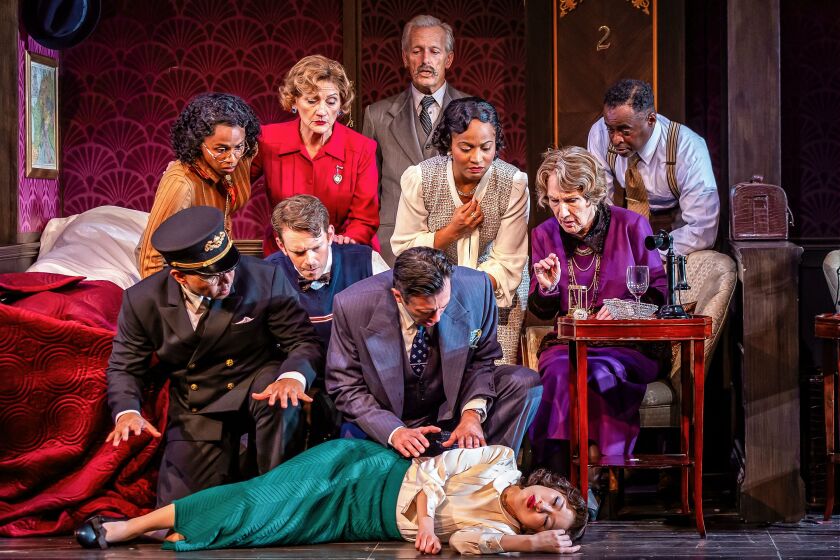There are few things in literary life more delectable than a well-crafted Agatha Christie mystery. Her instincts for merging ingenious plot twists, memorable characters and far-flung locales were impeccable and have inarguably stood the test of time.
“Murder on the Orient Express,” named for the famed (now gone) luxury train that once traveled from Paris to Istanbul, is a prime example. In addition to the intriguing titular locale and an embarrassment of memorably idiosyncratic characters, the 1930s-set mystery has a classic Christie ending — one that makes perfect, obvious sense and that you don’t see coming until the play spells it out.
In the Drury Lane Theatre production of the rail-bound murder mystery that opened Thursday night, director Jessica Fisch has the kind of ensemble that speaks to the depth of Chicago’s casting pool. Every single eccentric portrayed by this sprawling ensemble is as vivid as they are memorable.
The trouble with the production lies not in the story or that mighty ensemble. It’s in Ken Ludwig’s script, adapted for the stage from the 1934 novel. On stage, this adaptation is laborious in exposition, extremely so. There are vast chunks of dialogue where static blocking renders detective work minutiae a chore to be endured until the “aha!” moment. Fisch has Hercule Poirot (Larry Yando) delivering Poirot’s elegant reasoning with the kind of slow, patiently deliberate delivery one associates with grade-school teachers trying to explain long-division. In places, it clunks harder than a dead body falling from its bunk. In the second act, what feels like slow motion literally becomes slow motion, as the actors mime moments from earlier in the show. Repeatedly.
The pacing is markedly hampered by the show’s unwieldly, boxy set. Andrew Boyce’s scenic design includes rectangular units that rotate to depict the train’s various compartments and dining cars, along with pre-boarding locales. Every rotation is a cumbersome process, and despite a preponderance of atmospheric audio (from composers and sound designers Mikhail Fiskel and Jeffrey Levin), moody silhouettes (Paul Toben lights the space, sometimes with cinematic warmth, sometimes with ice-cold film noir tones) and noir-based projections (by Anthony Churchill), the scenic revolutions stop the story cold every time it happens.
Fisch’s staging veers in tone from high camp to earnest, dour tragedy to goofy hijinx, never finding the tricky balance between them needed to tell Christie’s mystery, which contains elements of grimness and brutality.
The plot unfolds primarily on the titular train. World-famous detective Hercule Poirot is on vacation; the hilariously focused train owner Monsieur Bouc (Sean Blake endearing even when ruthlessly single-minded about protecting his vehicle) has welcomed him about as his honored guest.
The passengers are an interesting lot. Samuel Ratchett (Keith Kupferer) is a sleazy businessman of dubious intent, menacing deportment and sinister entitlement. Helen Hubbard (Janet Ulrich Brooks) is a cheerfully randy woman with a hale, hearty demeanor and a wide grin that seems to flash fangs when she wants something. Princess Dragomiroff (Peggy Roeder) carries her power in her impeccable posture and will not suffer fools. And as Countess Andrenyi, Diana Coates is every inch someone you’d swear could hold her own in a high-stakes gambling hall as well as a royal court.
When one of their own turns up dead (stabbed eight times), Poirot gives up all hope of vacation and the train — which has become snowbound somewhere in Eastern Europe — becomes a hotbed of danger and suspicion and film-noir worthy intrigue. The earlier murder of a four-year-old child plays a part in the plot, and the specter of the victim hangs over all.
Despite the snail’s space with which the action moves along, Ludwig does include some memorable monologues. It is a gift to hear Yando’s as Poirot, defending his moral code. Likewise Brooks’ Helen, refusing to be shamed for openly wanting naps and sex. Ditto Roeder as a grand dame whose rumination on justice will make you shiver. But several powerful monologues can’t save this plodding script.
In all, this isn’t “Murder on the Orient Express” so much as it is “Murder on the Orient Local Lanes at Rush Hour.”






